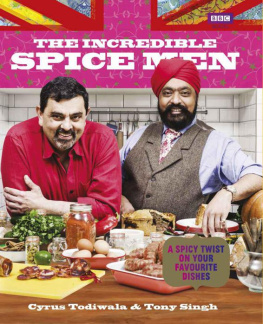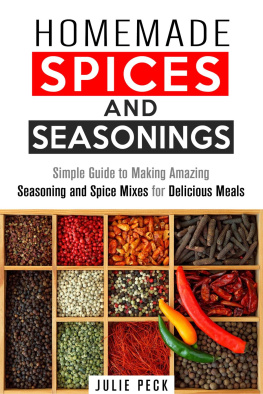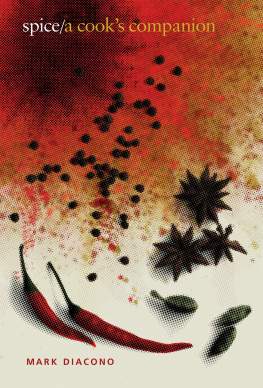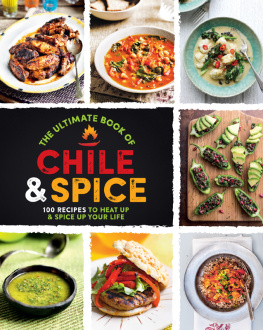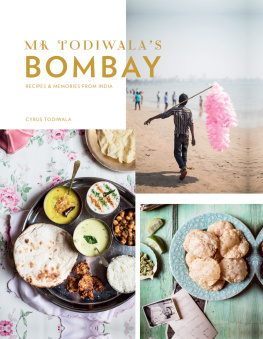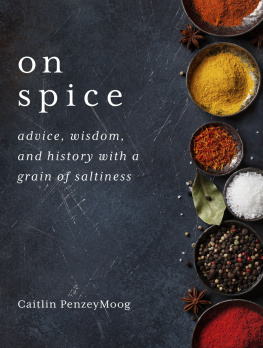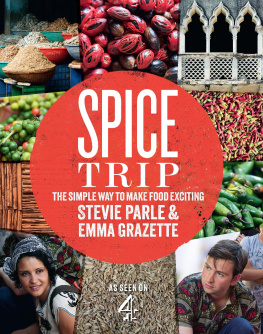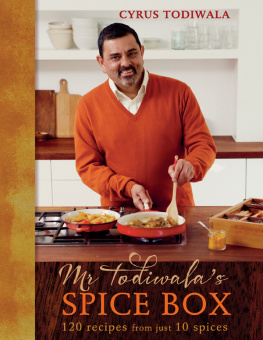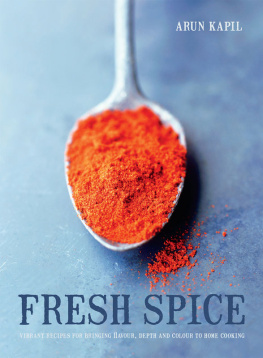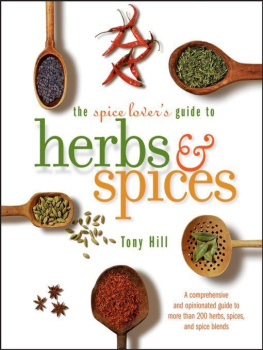List of Recipes
About the Book
Acclaimed chefs Tony Singh and Cyrus Todiwala are on a mission to wake Britain up to the versatility of spices.
For too long, our spices have sat unused and dusty in cupboard shelves, when just a mere sprinking of cumin, a dash of turmeric or a handful of star anise has the power to turn our everyday food into an explosion of tastes and smells.
Tony and Cyrus have taken to the road, exploring the British Isles and adding their own spicy twist to our most classic and best-loved dishes. Try jazzing up a Sunday roast chicken with a honey and ginger, adding a cumin and coriander kick to a shepherds pie or lacing a Victoria sponge with aromatic fennel seeds and cardamom.
With delicious, everyday recipes accompanied by Cyrus and Tonys top tips and favourite spices, The Incredible Spice Men will demystify the contents of your spice rack, and open your everyday cooking up to a world of exciting new flavours.
About the Authors
Cyrus Todiwala OBE DL was born in Bombay and has lived in England for over twenty years. As well as running three successful restaurants, he has written a number of cookery books. A passionate campaigner for sustainability and British produce, Cyrus was awarded an MBE and an OBE, is a Deputy Lieutenant of Greater London, and cooked for the Queen on her Diamond Jubilee Tour in 2012.
Tony Singh was born in Leith, and has held positions on the Royal Yacht Britannia and at the Balmoral Hotel, as well as running a string of award-winning restaurants in Edinburgh. A winner of the Scottish Chefs Award for Scottish Chef of the Year, Tony also oversees several pop-up restaurants and a cookery school. He has a passion for combining British ingredients with flavours influenced by his Sikh upbringing.
Tony and I have been friends for quite a time now, but we come from different sides of the world, and from different religious and social cultures. Tony is a Sikh and a fourth generation Scot, born in Scotland. I am a Parsee and Zoroastrian, born in Bombay, but England has been my home since I moved here over twenty years ago.
At the same time, though, Tony and I share much more than divides us: we are passionately British, although still very much tied to the subcontinent, and we are equally passionate about cooking, eating and spicing. Spices are in our blood, so it was almost inevitable that we should join in a quest to reintroduce Britain to the magic that is spices. Together we have become spice missionaries, and we hope very sincerely that we can convert you.
I grew up with spices; in India everyone does. My mother was a great cook, for a start everything we ate was imbued with spices and flavour and she was also a good teacher. Most of what I know today about cooking and cuisine started in my mothers kitchen. When I reached the age of responsibility perhaps around seven? I was sent to buy what we needed for the days meals, animal, vegetable and spice. By this time, I knew what to look for in a spice: for example, the right colour of cardamom pod and peppercorns that hadnt been adulterated with dried papaya seeds. The stallholders would be scathing: Go away, child, as I carefully watched their scale for an errant finger weighting it down. (Spices at that time were sold in 10g portions, so the scales were goldsmiths scales, tiny, easy to unbalance.) Later I earned some pocket money by doing the shopping for all of our neighbours. I would spend my earnings on fruit trifle, basically jelly and custard Ive always had a sweet tooth!
But the fact is, I knew my spices, and even now, everything to do with spices fascinates me. Spices are, variously and magically, the seeds, bark, buds, kernels, berries, pods, fruits and rhizomes of various trees, shrubs, vines and grasses. Most of the important spice plants come from tropical Asia: these include cassia, cardamom, cinnamon, pepper, star anise and cloves. Several spices, such as cumin, coriander, caraway, dill and fennel, originate from nearer home, from Europe and western Asia. And it was only in the sixteenth century that many spices from the Americas were introduced to Europe and the wider world, including such widespread flavours as allspice and vanilla.
Spices have been used since time immemorial, not only in cooking but also for medicinal purposes. For instance, cassia and cinnamon are both mentioned in Chinese herbals dating back some 4,500 years. Ayurvedic medicine in India has always valued spices, and in both China and India, spices are still used in cooking as much for their perceived ability to promote health as for the wondrous flavours they impart to food.
During the fifteenth and sixteenth centuries in Europe, spices were very highly valued, and unbelievably expensive to buy. They were thought to be so protective against illness, including the dreaded plague, that many were willing to risk their lives in pursuit of them. It was the European appetite for spices, particularly for cloves, cinnamon and nutmeg, that was the driving force behind that eras great and dangerous voyages of discovery: Columbus, for instance, only discovered the Americas because he was seeking an alternative, westerly route to the East and its wealth of spices.
Spices were always an important item of trade. The Chinese took them along the Silk Road, the Arabs introduced them to Europe. But there was a dark heart to the spice trade. While fortunes were made, many lives were lost in the greedy pursuit of spices. However, control over the pepper trade, for instance, was one of the factors that led to the British Raj, to Anglo-Indian cuisine, to the spread of curry restaurants and thus spices throughout Britain from the 1920s.
It seems to me that Britain today has forgotten about spices to a large extent. Tony and I want to jog your memories, to get you to dust off old habits, to bring your spice jars from the back of the cupboard to the front (you can even keep them in your fridge it will preserve the spices for much longer). We want you to re-think how and what you cook, every time you cook. In Britain we have some of the best meats and fish in the world, and a multitude of wonderful home-grown and imported fruit and vegetables. We also have access to some of the best spices in the world. Whenever I go back to India, I have to take spices with me, as the best Indian spices are actually exported to the UK!
Learn how to spice up your basic recipes a pinch here and there and dont be afraid. Spicy doesnt necessarily mean hot: spices are also sweet, warm and pungent, and will add colour, drama and excitement to your everyday cooking. And we mean every day
Tony and I share a simple message: lets spice up Britain again!

